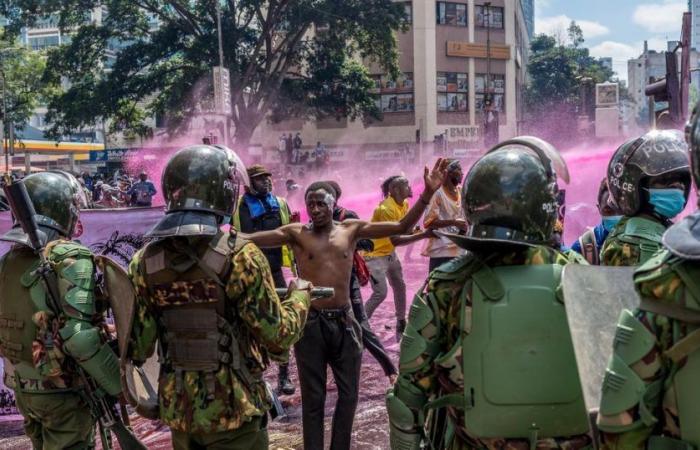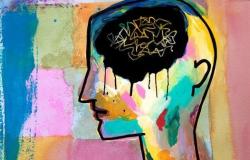
REPORTAGE – The youth mobilization day in Nairobi gave rise to violent clashes with the police. The army has been deployed and President Ruto is expected to speak at the end of the day.
In Nairobi (Kenya)
Thousands of young people poured into the streets of downtown Nairobi on Tuesday to proclaim their anger against the high cost of living and the government’s decision to increase VAT on several basic necessities. Dressed in black, displaying Kenyan flags and provocative signs, they chant slogans against President William Ruto and his controversial finance law.
Florence, 24, holds up a sign accusing Ruto of being a thief: « I haven’t had a job for four years, I don’t make any money, I’m already suffering, but all prices are going to go up, it’s not fair ! » Young people are the first victims of the price increase, as more than 30% are affected by unemployment. While protests in Kenya are usually led by the opposition party, this one stands out for its youth, its apolitical character and, until this week, its pacifism. The movement, called Occupy Parliament, was quickly structured on social networks.
Le Figaro
« Ruto must go, I voted for him, but he betrayed us, we do not want his law or his government. No politician supports us, it is only us, the Kenyan youth, who must fight », shouts James, a 22-year-old student.
Parliament invaded
At midday, this already lively atmosphere quickly gave way to surges of violence when the text had just been voted on. While the police used tear gas and water cannons, some of the demonstrators managed to enter Parliament, ransacking and burning part of the premises.
The police reaction then became more brutal, with numerous gunshots ringing out in the center of the capital. The human toll could be heavy, with five deaths and hundreds of injuries already to be deplored. Human rights associations also report twenty-four kidnappings of suspected leaders since the day before and more than fifty arrests during the demonstration. The army has been deployed and Kenyan President William Ruto could address the country later today to announce emergency measures.
The scale of the protests surprised the government, and some of the most controversial measures have already been removed from the text. These include taxes on bread, sanitary napkins, cooking oil, sugar, cars and mobile payments. Concessions deemed insufficient by the demonstrators.
A budget under pressure
These measures on basic consumer products are particularly criticized in a context of persistent inflation, at 5.1% over one year, according to the Kenyan Central Bank. President Ruto, elected in 2022 on the promise of helping the poorest, has already alienated part of the population by having increased income tax and health contributions and doubled VAT on essence.
Torn between his budgetary imperatives and pressure from the street, President Ruto plans to raise an additional 2.18 billion euros through the finance law in order to straighten out the country’s accounts. It therefore expects a budget deficit of 3.3% of GDP, compared to 5.7% for the current financial year.
The head of state inherited a colossal debt from his predecessors while the Kenyan shilling suffered a sharp depreciation. He is now seeking to reduce his dependence on loans to make ends meet. Public debt stands at €76 billion – just over 70% of GDP – while debt service will amount to €7.2 billion in the next fiscal year. Enough to absorb more than half of tax revenue.
Read alsoKenya increasingly reluctant to lead an international mission in Port-au-Prince
Kenya has been under a program from the International Monetary Fund (IMF) since 2021. Which conditions its aid on an increase in taxes and serious tax reforms, noting that the country does not raise enough taxes.
But the demonstrators show little sensitivity to these budgetary arguments. The IMF is clearly seen as the hidden pen of this finance law. “ We are not the lab rats of the IMF », can we read on a sign.
Some argue that it would be better for Kenya to go bankrupt than to submit to these drastic tax measures. They criticize the mismanagement of the state, the increasing costs of the political class and the corruption which affects the country, citing examples of ongoing scandals, in particular a case of large-scale fictitious jobs. « Ruto and his government do not have the legitimacy to impose these new taxes on us. We don’t trust them », James gets angry.





